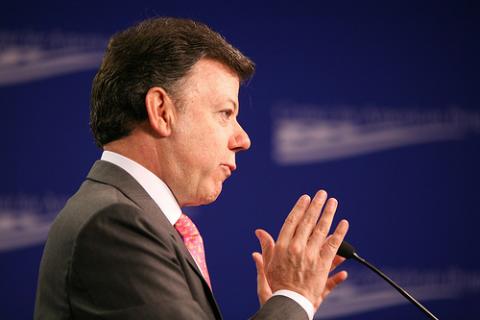The FTA with Colombia and Peru: European Parliament puts big business before workers' rights

Once again, despite its repeated fine words, the European Parliament this afternoon placed the interests of big business before workers' and human rights. It voted overwhelmingly (486 to 147, with 41 abstaining) to consent to the Free Trade Agreement (FTA) with Colombia and Peru. MEPs have been inundated with emails and reports from NGOs, human rights organisations and activists seeking for them to vote against this report, given the systematic abuses of human rights in Colombia. After all of these emails, we also received one seeking for us to vote in favour – this one came from BusinessEurope, EuroCommerce, the European Spirits Organisation, Diageo and other big business organisations. Guess which had more weight!
Every trade union confederation concerned has campaigned against this Free Trade Agreement - the Colombian CUT, the international ITUC, the European ETUC and the Irish ICTU. There have been very impressive campaigns waged by organisations such as Oidhaco, Trocaire, Christian Aid and many many others. Of course, that didn't stop MEPs in favour of the agreement arguing that the conclusion of it would improve workers' rights and human rights in Colombia!
The MEPs in favour have tried to paint a picture of a dramatically improving situation in Colombia. In particular, they have pointed to the ‘Action Plan’ developed by the Colombian government as showing the commitment of the government to improve the situation. This Action Plan followed a resolution from the Parliament in June 2012, which called for the establishment of a transparent and binding road map on human, environmental and labour rights.
But this Action Plan was not that. The International Office of Human Rights pointed to its limitations and the lack of progress on the ground. In fact it, was primarily a figleaf used to justify the vote in favour of MEPs, who could say that human rights were now being dealt with. It is supposedly already being implemented, yet human rights are not improving on the ground.
Instead, Colombia remains the most dangerous place on earth for trade unionists. Up until August this year, 17 trade unionists in Colombia had been killed and the Colombian trade union confederation, the CUT, recorded 146 threats to the lives of workers. Add to that the systematic abuses of the rights of human rights defenders, journalists and indigenous communities and there is a clear picture of a government without respect for human or workers' rights. A recent report by a number of international platforms and organisations details the ongoing and serious human rights abuses in all of these areas.
Another major issue is the very high rate of impunity, whereby over 90% of the victims of human rights abuses receive no justice. This could become even larger with a new proposed constitutional reform which would expand the jurisdiction of the military further.
At the moment, a retired general, Mauricio Santoyo, former security chief for ex-President Uribe, is on trial in the US. He has admitted helping the Colombian death squads (in particular, a paramilitary right-wing grouping called 'United Self-Defence of Colombia) to identify victims to be killed and to escape without getting caught. This is the same President Uribe with whom the European Commission negotiated this Free Trade Agreement and for whom current President Santos was defence minister.
Particular blame must attach to the Social Democrats on this issue. Their group, with its traditional links to the workers' movement, voted in its majority in favour of this agreement. Irish MEPs also received a recommendation from the Irish government to vote in favour - yet another betrayal by the Irish Labour Party. It is an illustration of how far these parties have travelled to the right when despite the unanimous calls of the trade union movement, they choose to place free trade and big business profits over workers' rights.
The Irish Labour MEPs were in the minority of Social Democrat MEPs who voted against the agreement, together with Independent MEP Marian Harkin and myself, while the Fine Gael and Fianna Fáil MEPs all voted in favour.
The consent vote from the European Parliament does not mean that the struggle against this agreement is over. There will now be votes in the parliaments in all of the Member States of the EU, and positive votes from all of them are required for the FTA to come into being. Massive pressure must therefore be brought to bear on the Dáil and the other parliaments in the EU to demand that they do not similarly place profits before workers' rights.
Paul Murphy is Socialist Party and United Left Alliance MEP for Dublin. www.paulmurphymep.eu.
Image top (Juan Manuel Santos, president of Colombia): Center for American Progress.
